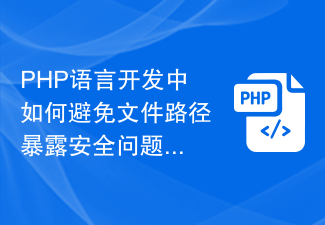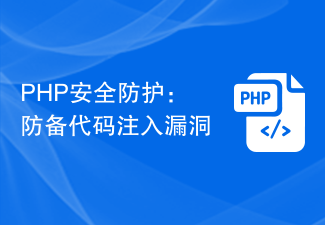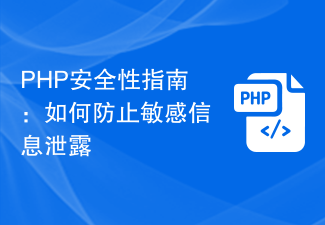Security and Performance Tradeoffs in PHP
Abstract:
As a popular web programming language, PHP not only provides a flexible development environment and rich functions, but also faces security issues and performance trade-offs. This article will explore security and performance issues in PHP and provide some code examples to illustrate how to strike a balance between the two.
Introduction:
In Web application development, security and performance are two interrelated but independently important aspects. The server-side language PHP has good programming features and powerful functions. However, unreasonable coding practices and security vulnerabilities may lead to application attacks and performance degradation. When developing PHP applications, we need to fully consider and weigh these two issues.
1. Security issues:
- Input verification:
In PHP, input verification is an important means to prevent malicious users from entering malicious codes or illegal characters. For example, when users enter HTML or JavaScript code into a form, we need to filter and escape it to prevent it from being executed. This can be achieved using PHP's built-in functions such as htmlspecialchars.
Code sample:
// 将所有的HTML标签转义 $clean_input = htmlspecialchars($_POST['input']);
- Prevent SQL injection:
SQL injection is a common web application vulnerability where attackers use input data to splice into malicious SQL statement, thereby performing illegal database operations. To prevent SQL injection, we can use parameterized queries or prepared statements to process database queries.
Code Example:
$stmt = $pdo->prepare('SELECT * FROM users WHERE username = :username');
$stmt->execute(['username' => $username]);- Preventing XSS Attacks:
Cross-site scripting (XSS) is another common web application vulnerability that allows attackers to inject Malicious scripts to obtain users' sensitive information or perform malicious actions. In order to prevent XSS attacks, we need to properly filter user input and output escape.
Code example:
//将用户输入转义并输出到网页中 echo htmlspecialchars($user_input);
2. Performance issues:
- Code optimization:
PHP is an interpreted language, its execution speed Relatively slow. Therefore, optimizing code is an important part of improving performance. The running efficiency of the program can be improved by avoiding repeated calculations and database operations, using appropriate data structures and algorithms, and using caching.
Code example:
//使用缓存来提高查询性能
$result = $cache->get('query_result');
if(!$result){
$result = $db->query('SELECT * FROM records');
$cache->set('query_result', $result);
}- Improve server performance:
In addition to optimizing the PHP code itself, you can also improve server performance through other means. For example, use a CDN to speed up the transfer of static files, enable output buffering, enable Gzip compression, use a suitable server architecture, etc.
Code sample:
//启用Gzip压缩
ob_start('ob_gzhandler');Conclusion:
In PHP development, security and performance are two important aspects. In order to maintain the security of the system, we need to perform input validation and prevent SQL injection and XSS attacks. In order to improve the performance of the system, we can optimize the code, use caching and improve server performance, etc. It is essential to weigh these two issues and find the balance point that suits your application in order to develop more reliable and efficient web applications.
The above is the detailed content of Security and performance trade-offs in PHP. For more information, please follow other related articles on the PHP Chinese website!
 PHP语言开发中如何避免图片木马等攻击?Jun 09, 2023 pm 10:37 PM
PHP语言开发中如何避免图片木马等攻击?Jun 09, 2023 pm 10:37 PM随着互联网的发展,网络攻击事件时有发生。其中,黑客利用漏洞进行图片木马等攻击已经成为常见的攻击手段之一。在PHP语言开发中,如何避免图片木马等攻击呢?首先,我们需要了解什么是图片木马。简单来说,图片木马就是指黑客在图片文件中植入恶意代码,当用户访问这些图片时,恶意代码会被激活并攻击用户的计算机系统。这种攻击手段常见于网页、论坛等各种网站。那么,如何避免图片木
 PHP安全性指南:防止HTTP参数污染攻击Jun 29, 2023 am 11:04 AM
PHP安全性指南:防止HTTP参数污染攻击Jun 29, 2023 am 11:04 AMPHP安全性指南:防止HTTP参数污染攻击导言:在开发和部署PHP应用程序时,保障应用程序的安全性是至关重要的。其中,防止HTTP参数污染攻击是一个重要的方面。本文将介绍什么是HTTP参数污染攻击,以及如何通过一些关键的安全措施来防止这种攻击。什么是HTTP参数污染攻击?HTTP参数污染攻击是一种非常常见的网络攻击技术,它利用了Web应用程序在解析URL参数
 PHP语言开发中如何避免文件路径暴露安全问题?Jun 10, 2023 pm 12:24 PM
PHP语言开发中如何避免文件路径暴露安全问题?Jun 10, 2023 pm 12:24 PM随着互联网技术的不断发展,网站的安全问题也日趋突出,其中文件路径暴露安全问题是较为普遍的一种。文件路径暴露指的是攻击者可以通过一些手段得知网站程序的目录信息,从而进一步获取网站的敏感信息,对网站进行攻击。本文将介绍PHP语言开发中的文件路径暴露安全问题及其解决方法。一、文件路径暴露的原理在PHP程序开发中,我们通常使用相对路径或绝对路径访问文件,如下所示:相
 PHP中的Web安全防护May 25, 2023 am 08:01 AM
PHP中的Web安全防护May 25, 2023 am 08:01 AM在现今互联网社会中,Web安全已经成为了一个重要的问题。特别是对于使用PHP语言进行Web开发的开发人员来说,常常会面对各种安全攻击和威胁。本文将从PHPWeb应用的安全入手,讨论一些Web安全防护的方法和原则,来帮助PHPWeb开发人员提高应用的安全性。一、理解Web应用安全Web应用安全是指Web应用程序处理用户请求时,保护数据、系统和用户的安全性。
 PHP实现邮件发送中的安全技术May 23, 2023 pm 02:31 PM
PHP实现邮件发送中的安全技术May 23, 2023 pm 02:31 PM随着互联网的迅速发展,邮件已经成为了人们日常生活和工作中不可或缺的一部分,邮件的传输安全问题已经引起了越来越多的关注。PHP作为一种广泛应用于Web开发领域的编程语言,也扮演着实现邮件发送中安全技术的角色。本文将介绍PHP在邮件发送中如何实现以下安全技术:SSL/TLS加密传输邮件在互联网中传输的过程中,可能会被攻击者窃取或篡改,为了防止这种情况的发生,可以
 PHP中如何进行数据安全和信息隐私保护?May 21, 2023 pm 08:21 PM
PHP中如何进行数据安全和信息隐私保护?May 21, 2023 pm 08:21 PM随着互联网的快速发展,数据安全和信息隐私保护变得越来越重要。尤其是在Web应用程序中,用户的敏感数据和隐私信息需要得到有效的保护。PHP是一种流行的服务器端编程语言,它可以被用来构建强大的Web应用程序。但是,PHP开发人员需要采取一些措施来确保数据的安全和保护用户的隐私。以下是一些关于在PHP中进行数据安全和信息隐私保护的建议。使用密码哈希算法密码哈希算法
 PHP安全防护:防备代码注入漏洞Jun 24, 2023 am 09:30 AM
PHP安全防护:防备代码注入漏洞Jun 24, 2023 am 09:30 AM随着互联网时代的到来,PHP作为一种开源脚本语言,被广泛应用于Web开发中,特别是在动态网站的开发中扮演着重要的角色。然而,安全问题却也成为了PHP发展中不可忽视的问题。其中,代码注入漏洞因为其难以防范和致命的危害,一直是Web安全领域的热门话题之一。本文将介绍PHP中代码注入漏洞的原理、危害及其预防方法。一、代码注入漏洞的原理和危害代码注入漏洞又称为SQL
 PHP安全性指南:如何防止敏感信息泄露Jun 29, 2023 am 11:29 AM
PHP安全性指南:如何防止敏感信息泄露Jun 29, 2023 am 11:29 AMPHP安全性指南:如何防止敏感信息泄露引言:随着互联网的迅速发展,信息安全已经成为一个日益重要的话题。特别是对于网站开发者来说,保护用户的敏感信息是至关重要的。本文将介绍一些PHP安全性的最佳实践,以帮助开发者防止敏感信息泄露。加密和解密加密是一种保护敏感信息的重要方法。使用PHP内置的加密函数,如base64_encode()和base64_decode(


Hot AI Tools

Undresser.AI Undress
AI-powered app for creating realistic nude photos

AI Clothes Remover
Online AI tool for removing clothes from photos.

Undress AI Tool
Undress images for free

Clothoff.io
AI clothes remover

AI Hentai Generator
Generate AI Hentai for free.

Hot Article

Hot Tools

SAP NetWeaver Server Adapter for Eclipse
Integrate Eclipse with SAP NetWeaver application server.

PhpStorm Mac version
The latest (2018.2.1) professional PHP integrated development tool

DVWA
Damn Vulnerable Web App (DVWA) is a PHP/MySQL web application that is very vulnerable. Its main goals are to be an aid for security professionals to test their skills and tools in a legal environment, to help web developers better understand the process of securing web applications, and to help teachers/students teach/learn in a classroom environment Web application security. The goal of DVWA is to practice some of the most common web vulnerabilities through a simple and straightforward interface, with varying degrees of difficulty. Please note that this software

SublimeText3 English version
Recommended: Win version, supports code prompts!

ZendStudio 13.5.1 Mac
Powerful PHP integrated development environment






